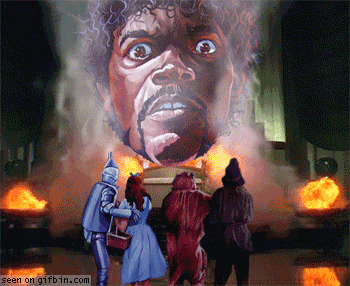
Posted on 03/18/2009 11:09:14 AM PDT by BGHater
The Wonderful Wizard of Oz is one of the world's best-loved fairytales. As Judy Garland's famous film nears its 70th birthday, how much do its followers know about the story's use as an economic parable?
Dorothy in Kansas conjures up nostalgic thoughts of childhood Christmases hiding behind the sofa from the Wicked Witch of the West. Or those flying monkeys.
It's unlikely its young fans will have been thinking about deflation and monetary policy.
But the story has underlying economic and political references that make it a popular tool for teaching university and high school students - mainly in the United States but also in the UK - about the economic depression of the late 19th Century.
At a time when some economists fear an onset of deflation, and economic certainties melt away like a drenched wicked witch, what can be learnt from Oz?
The 1939 film starring a young Judy Garland was based on Lyman Frank Baum's book, The Wonderful Wizard of Oz, published in 1900. It told of an orphaned Kansas girl swept by a tornado into a fantastical world, but who wants to return home to her aunt and uncle.
Thinking the great Wizard of Oz can grant her wish, she sets out to meet him with her beloved dog, Toto, joined by a scarecrow, a tin woodman and a lion.
Baum published the book in 1900, just after the US emerged from a period of deflation and depression. Prices had fallen by about 22% over the previous 16 years, causing huge debt.
Farmers were among those badly affected, and the Populist political party was set up to represent their interests and those of industrial labourers.
(Excerpt) Read more at news.bbc.co.uk ...
I think this story takes a metaphor a little too far.
I always remember hearing the urban legend about the dwarf who committed suicide in the background of one of the scenes, and they left it in one frame of the film. I love urban legends!
This notion has been around forever. I agree that you can see some interesting correlations, but there’s no evidence to think that Baum put this symbolism into the book. It’s like looking at clouds — that one may look like a duck, but that doesn’t mean it’s a duck.

“nostalgic thoughts of childhood Christmases hiding behind the sofa from the Wicked Witch of the West. Or those flying monkeys”
When I was a kid, Margaret Hamilton and those monkeys scared me Shi’ite-less. “I’ll get you, my pretty, and your little dog too!”
Surrender, Dorothy AKA Everyman.
Of course then there’s the “Family Guy” alternate ending:
Dorothy: Goodbye, Tinman
Tinman: Goodbye, Dorothy
Dorothy: Goodbye, Lion
Lion: Goodbye, Dorothy
Dorothy: And Scarecrow, I’ll miss you most of all
Tinman: Uh...wow...that’s kind of a weird thing to say with both of us standing here...
Lion: Yeah, gee...I thought this was a team effort here
I once took a class in college called “Pilgrimage.”
I remember learning the theory that the Wizard of Oz is all about pilgrimage, with lots of religious connotations. Fun class.
I also remember that the Super Bowl was described as a sort of pilgrimage too. . .
Ah, college, fun times.
"What the f**k did I just tell you about that m------rf---in' curtain??!"
I remember watching one of the Lord of the Rings movies and thinking that it was just an updated Wizard of Oz in many ways.
Now we just have the Wizard of Uhs.

Wasn’t one of the actors (Ray Bolger?) the uncle of Congressman Bob Dornan?
According to Wikipedia, Jack Haley (the Tinman) was Dornan’s uncle:
http://en.wikipedia.org/wiki/Robert_Dornan
Thnaks—couldn’t remember which one was his uncle.
Disclaimer: Opinions posted on Free Republic are those of the individual posters and do not necessarily represent the opinion of Free Republic or its management. All materials posted herein are protected by copyright law and the exemption for fair use of copyrighted works.